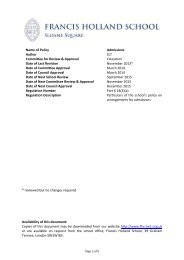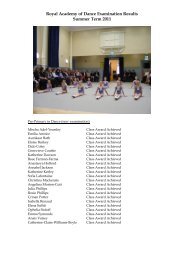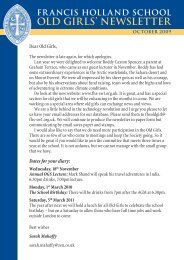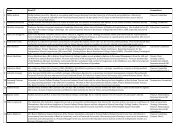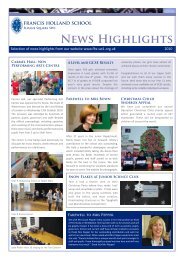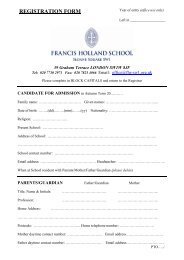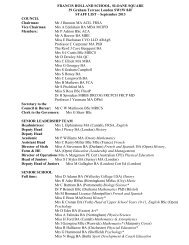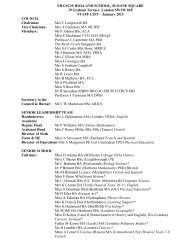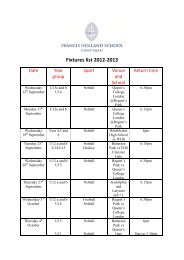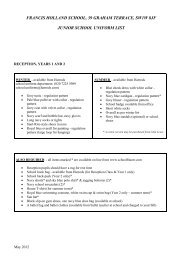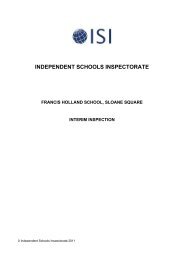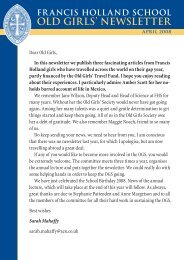Newsletter 2012 - Francis Holland School
Newsletter 2012 - Francis Holland School
Newsletter 2012 - Francis Holland School
You also want an ePaper? Increase the reach of your titles
YUMPU automatically turns print PDFs into web optimized ePapers that Google loves.
diabetes. On one occasion, after seeing our horrified expressions at an ad-hoc toe<br />
amputation (using minimal quantities of local anaesthetic), the doctor joked, “I’ve<br />
got a bigger amputation to do tomorrow, would you like to do it?”<br />
As well as gaining more clinical experience, it was interesting to compare the<br />
differences between hospital wards in Fiji and at home. For instance, whilst we<br />
are used to having bountiful supplies of alcohol gel at the end of patients’ beds<br />
and a ‘bare below the elbows’ policy in the NHS, in Fiji we had to search for soap<br />
and often had to walk to the maternity ward on the other side of the hospital to<br />
wash our hands. The busy doctors resorted to wiping their hands on the dirty<br />
bedside curtains.<br />
Our small donation of gloves and tourniquets seemed like a tiny drop in the<br />
ocean. Especially as the staff seemed quite adamant to use the gloves not for<br />
protection but as tourniquets, preferring to leave the new pristine tourniquets<br />
to decorate the equipment trolley. We were impressed and amused to see other<br />
ways in which Fijian doctors improvised when equipment was limited. On a<br />
more serious note, we found the Fijian doctors to be truly inspirational. Despite<br />
being overworked and underpaid, they cared about the patient and the person.<br />
Having fewer tests to depend on, they had developed amazing clinical skills and<br />
maintained a very high level of knowledge.<br />
In addition, we were impressed by how well the Fijian patients coped despite<br />
the evident shortcomings of their healthcare system. Native Fijians are devout<br />
Christians and their religion seems to give them great strength. But sometimes this<br />
proves to be a hindrance. We met many people who remained remarkably calm in<br />
the face of death including one lady who despite being diagnosed with a particularly<br />
aggressive breast cancer in her mid-thirties was surprisingly positive and never<br />
stopped smiling, reassured by her belief in God.<br />
Towards the end of our stay we were fortunate enough to spend a day<br />
accompanying some Fijian medical students on a visit to the local Moala Village.<br />
Every year, the students are required to design and carry out a public health project<br />
in a local village. On this preliminary visit, the students were aiming to ascertain<br />
which aspects of the villagers’ health they could monitor and improve. They<br />
were planning to collect data about the villagers’ weight, diet, physical exercise,<br />
smoking, blood pressure, cholesterol and blood sugar levels and provide them with<br />
health education.<br />
Knowing that conservative attire was required for village visits, we made sure our<br />
shoulders were covered and decided it was best to wear trousers. However, when<br />
we saw the medical students were wearing traditional Fijian costume, we knew<br />
we should have opted for a floral floor-length skirt with a matching top. Having<br />
realised the only male medical student, Jona, had failed to make this clear, the girls<br />
reassured us that we could go along in our trousers. It has to be said that it was not<br />
much of a comfort when we saw Jona himself was also wearing a skirt or, as the<br />
Fijians would call it, a “sulu.” Despite feeling slightly self-conscious, we climbed<br />
into the only “ambulance” (a van with a bed) in Nadi for a lift to Moala Village.<br />
After a bumpy ride, we arrived and were introduced to the local village chief.



